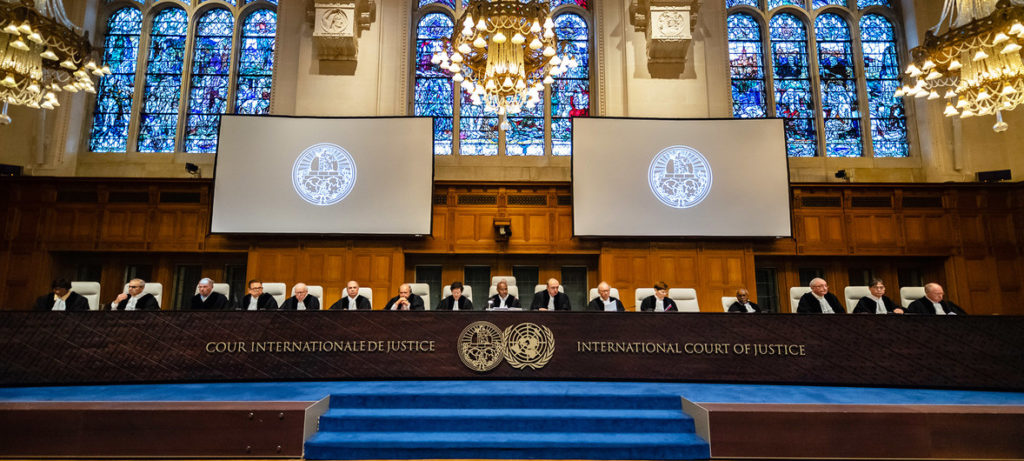The world commemorated, on the 75thanniversary of Auschwitz – Birkenau, the death of Jewish people by Nazis as a planned genocide during World War II. The horrors of the story is explicitly based on the systematic persecution of Jews. Significantly, their religious identity was utilized as a tool of war, when Jews were transported to the concentration camps. In a present-day, our understanding on Rohingya genocide should be stronger than before; however, the deliberate response of the international community was not pronounced timely, to acknowledge and adverse the atrocities.
As the human rights violations have worsened in Myanmar against Rohingya population since 2017, Gambia with the support of Organization of Islamic Conference member states brought attention of mass atrocities at the International Court of Justice. Human rights violations in Myanmar has now become questionable and has gone through intense scrutiny. According to International Law, Myanmar’s government has a responsibility to protect its own citizens, rather than perpetrating genocide against its own population. Unfortunately, its own government has been denying to grant citizenship to Rohingyas and has been considering them as illegal immigrants from Bangladesh living in Myanmar. Presently, Rohingyas are forcefully displaced out of their homes by its own government and they are living as refugees in Bangladesh in a desperate condition.
Women’s condition as refugees has worsened over time and, according to the Independent:
“After fleeing violence and discrimination in Myanmar these women and girls are now struggling to cope with the loss and trauma they have experienced, to stay safe in the camps and for basic survival… Maternal and infant health in the camps around Cox’s Bazar is an ongoing concern and women and girls in the camps are looking for safe spaces for trauma counselling and providing clean water, hygiene and healthcare.”[1]
Razia Sultana is a Rohingya human rights activist, she deliberately stated:
“In Myanmar, rape was as much a tool of genocide as machine-guns and mortar shells. The use of rape as a weapon of war was not incidental: it was the cornerstone of a deliberate strategy of forced exile, to eradicate the Rohingya population from Rakhine State … Women and girls of reproductive age were intentionally selected, the report said, and so severely injured that many are now unable to bear children.”[2]
Also, the Myanmar’s military is considered as the “most powerful institution, with control of key ministries and autonomy from civilian oversight.”[3]The displacement of civilians and killings of Rohingyas were stated by law enforcement as a security clearance operation against terrorists – a part of its responsibility. The United Nations Fact Finding Mission stated in its reports and discussions about the clear evidences of the human rights violations in Myanmar. Consequently, the government is also accused of destroying the evidences, which were based on the astounding genocidal acts.[4]
As the extensive atrocities and massive genocidal evidences have become evident, Gambia brought the matter as a complaint under the Genocide Convention at the International Court of Justice. The verdict was clear: Explicitly, the government is just a mere bystander and it’s unable to stop the perpetrators or itself, a perpetrator, of committing genocide. The International Court of Justice has ordered Myanmar government to take precautionary measures to stop the genocide. The ICJ has also made an explicit statement to Myanmar’s military and police not to commit any genocidal acts against its own people.[5]
The court has taken the suffering of the Rohingya population seriously and made it clear that the international scrutiny is still continuing. The court ordered its government to report regularly on its implementation of the order after every six months, but there is still immediate protection required for remaining Rohingya population who are living in Myanmar.[6]
The Court’s decision has turned out as a victory of the international law and international justice that genocide will not be accepted under any given situation by perpetrators. [7] History of genocide is evident, whether it is Auschwitz or Rohingya genocide. It is still late to acknowledge Rohingya’s sufferings, but the reminiscent of sufferings inside the Jewish concentration camps and Rohingya camps is undeniable, when religious identity is subjected as a targeted against civilians.
What we need to know now? As Rohingyas are living under the constant state of permanent segregation and the perpetrators are still in power, the United Nations Security Council should have to comply with its political and moral duty. China and Russia have to avoid using veto, and the Council has to explore safer conditions, so that Rohingyas can be returned to Myanmar with rights and guarantees of their protection.
[1]Independent, “Life for Rohingya Women, the Real and Hidden Crisis,” Last modified on 8 Mar, 2019, https://www.independent.co.uk/arts-entertainment/photography/rohingya-international-womens-day-photos-burma-myanmar-muslim-refugee-a8801416.html
[2]Razia Sultana, “It’s Time for Justice for the Rohingya community – and Women can’t be Left Behind,” The Globe and Mail, Last modified on 24 January 2020, https://www.theglobeandmail.com/opinion/article-its-time-for-justice-for-the-rohingya-community-and-women-cant-be/
[3]Human Rights Watch, “Myanmar (Burma),” https://www.hrw.org/asia/myanmar-burma
[4]Human Rights Watch, “Questions and Answers on Gambia’s Genocide Case Against Myanmar before the International Court of Justice,” Last modified on 5 Dec, 2019, https://www.hrw.org/news/2019/12/05/questions-and-answers-gambias-genocide-case-against-myanmar-international-court
[5]Atrocity Alert, Global Centre for the Responsibility to Protect, No. 188, 29 January 2020, https://www.globalr2p.org/publications/atrocity-alert-no-188-myanmar-burma-burkina-faso-and-syria/
[6]Pram Preet Singh Interview, “Landmark World Court Order Protects Rohingya from Genocide”, Human Rights Watch, Last modified on 27 Jan, 2020, https://www.hrw.org/news/2020/01/27/interview-landmark-world-court-order-protects-rohingya-genocide
[7]BBC News, “Myanmar Rohingya: World Court Orders Prevention of Genocide,” 23 Jan, 2020 https://www.bbc.com/news/world-asia-51221029

